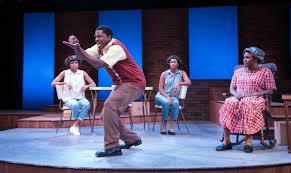
Two things affected my viewing of Raisin, the Musical. I love and don’t think any version or adaptation can beat the ur play, A Raisin in the Sun. Like its author, Lorraine Hansberry, I was a born and bred Chicagoan, though a few years younger than she in 1951 and we lived apart in predominantly Black and White areas of the city. Unlike Hansberry or the creators of Raisin, however, I attended an unusual, small private high school that was integrated by nationality (including African, Asian, Hispanic, Native American, European) and mingled with students of all these kinds. We visited each other’s neighborhoods for mixers and performances and the like, usually on weekends. We got to know at least a bit of those neighborhoods. Hansberry in her play got most things right; the musical has things in it that, unfortunately, grew to happen later. The opening of a white policeman hustling two black youths is a case in point. It lessens the horror of the betrayal of Walter by “friends” later, as if there’s a horrible white for every horrible black, and makes one fear for the physical well-being of Walter and family if they move where whites predominate. The plot of the musical still follows that of the play. Walter, wife Ruth, and son Travis live with his mother Lena in a roach-laden tenement apartment on the predominantly Black South Side of Chicago. He feels demeaned by his job as a driver and wants to be richer and his own boss, co-owner of a liquor store. He hopes to borrow from his mother the $10,000 she’ll soon get from her dead husband’s insurance. Religious, Lena hates the idea of making money from selling alcohol. Walter’s sister Beneatha takes science classes and wants to go to medical school. She also seeks her “identity” in African history and is now dating a mature graduate student from Nigeria who hopes to return there as a leader. Lena, who has put a downpayment on a house in Clybourne Park, a white conclave, in anticipation of the insurance is persuaded by Walter to give him the money after putting aside $3000 for Beneatha’s education. The climax? What Walter actually does. Much time is given to the musical’s new emphasis on lovemaking of Walter and wife, of Walter drinking with his pals who aren’t his pals, on Beneatha’s imagining African dances that look here very much like what are usually done for tourists, and Mama Lena singing her prayers, hopes and upsets in and out of church. The combination just seems to go on too long. And no song or lyric wedges into one’s memory. I had to seek a cast recording to figure out main lyrical messages. What’s so fine about WBBT’s production are both the dramatic and musical performances, headed by Brian L. Boyd’s wonderful true Chicagoan-of-the-time Walter (whose drinking shouldn’t have been needed in the plot) and Janie Jones, going from her last FST sexy singing to a mother’s passionate renderings of dedication to her family, her tradition, her God. Lovely JoAnna Ford is no stereotype as Walter’s wife, and Samuel Waite carries on his tradition of remarkable, poised singer and actor as their son Travis. Director Jim Weaver is better choreographing movement than dancing, but he can’t be faulted as a stage director for getting stellar performances from all the cast. Kiara Hines’s Beneatha is truly realistic in her interactions with William Tipton’s aspiring Nigerian Joseph Asagai, though he seems at times a bit stiff. Perhaps that’s because he speaks in normal volume when most of the cast, especially the singers, are over-miked. A good example is Ashley D. Brooks’ quite authentic jazz singer. Costumes are first-rate, especially those of the Ensemble of South Siders and Earley Dean’s Pastor and his flock. There’s a curious mix of mimed props but miming of doors and other extrances-exits works well, as do the various stairways and other levels and wide downstage area that comprise the set. Varied lighting helps immensely. I just wish the musical had not strayed as far as it does from the play and was truer to the time of 1951 and the facts of Chicago at the time. Surprisingly, it attenuates the disgusting behavior of the Clybourne whites, which Tom Foley tries to show in his role as their representative Karl Lindner. It’s one more example of how director Jim Weaver had so much work cut out for him.
